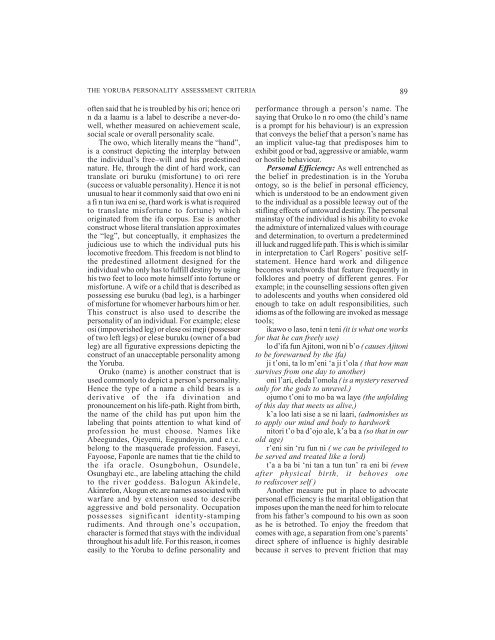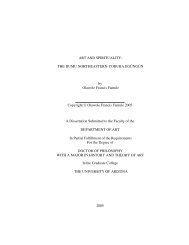The Yoruba Personality Assessment Criteria
You also want an ePaper? Increase the reach of your titles
YUMPU automatically turns print PDFs into web optimized ePapers that Google loves.
THE YORUBA PERSONALITY ASSESSMENT CRITERIA 89<br />
often said that he is troubled by his ori; hence ori<br />
n da a laamu is a label to describe a never-dowell,<br />
whether measured on achievement scale,<br />
social scale or overall personality scale.<br />
<strong>The</strong> owo, which literally means the “hand”,<br />
is a construct depicting the interplay between<br />
the individual’s free–will and his predestined<br />
nature. He, through the dint of hard work, can<br />
translate ori buruku (misfortune) to ori rere<br />
(success or valuable personality). Hence it is not<br />
unusual to hear it commonly said that owo eni ni<br />
a fi n tun iwa eni se, (hard work is what is required<br />
to translate misfortune to fortune) which<br />
originated from the ifa corpus. Ese is another<br />
construct whose literal translation approximates<br />
the “leg”, but conceptually, it emphasizes the<br />
judicious use to which the individual puts his<br />
locomotive freedom. This freedom is not blind to<br />
the predestined allotment designed for the<br />
individual who only has to fulfill destiny by using<br />
his two feet to loco mote himself into fortune or<br />
misfortune. A wife or a child that is described as<br />
possessing ese buruku (bad leg), is a harbinger<br />
of misfortune for whomever harbours him or her.<br />
This construct is also used to describe the<br />
personality of an individual. For example; elese<br />
osi (impoverished leg) or elese osi meji (possessor<br />
of two left legs) or elese buruku (owner of a bad<br />
leg) are all figurative expressions depicting the<br />
construct of an unacceptable personality among<br />
the <strong>Yoruba</strong>.<br />
Oruko (name) is another construct that is<br />
used commonly to depict a person’s personality.<br />
Hence the type of a name a child bears is a<br />
derivative of the ifa divination and<br />
pronouncement on his life-path. Right from birth,<br />
the name of the child has put upon him the<br />
labeling that points attention to what kind of<br />
profession he must choose. Names like<br />
Abeegundes, Ojeyemi, Eegundoyin, and e.t.c.<br />
belong to the masquerade profession. Faseyi,<br />
Fayoose, Faponle are names that tie the child to<br />
the ifa oracle. Osungbohun, Osundele,<br />
Osungbayi etc., are labeling attaching the child<br />
to the river goddess. Balogun Akindele,<br />
Akinrefon, Akogun etc.are names associated with<br />
warfare and by extension used to describe<br />
aggressive and bold personality. Occupation<br />
possesses significant identity-stamping<br />
rudiments. And through one’s occupation,<br />
character is formed that stays with the individual<br />
throughout his adult life. For this reason, it comes<br />
easily to the <strong>Yoruba</strong> to define personality and<br />
performance through a person’s name. <strong>The</strong><br />
saying that Oruko lo n ro omo (the child’s name<br />
is a prompt for his behaviour) is an expression<br />
that conveys the belief that a person’s name has<br />
an implicit value-tag that predisposes him to<br />
exhibit good or bad, aggressive or amiable, warm<br />
or hostile behaviour.<br />
Personal Efficiency: As well entrenched as<br />
the belief in predestination is in the <strong>Yoruba</strong><br />
ontogy, so is the belief in personal efficiency,<br />
which is understood to be an endowment given<br />
to the individual as a possible leeway out of the<br />
stifling effects of untoward destiny. <strong>The</strong> personal<br />
mainstay of the individual is his ability to evoke<br />
the admixture of internalized values with courage<br />
and determination, to overturn a predetermined<br />
ill luck and rugged life path. This is which is similar<br />
in interpretation to Carl Rogers’ positive selfstatement.<br />
Hence hard work and diligence<br />
becomes watchwords that feature frequently in<br />
folklores and poetry of different genres. For<br />
example; in the counselling sessions often given<br />
to adolescents and youths when considered old<br />
enough to take on adult responsibilities, such<br />
idioms as of the following are invoked as message<br />
tools;<br />
ikawo o laso, teni n teni (it is what one works<br />
for that he can freely use)<br />
lo d’ifa fun Ajitoni, won ni b’o ( causes Ajitoni<br />
to be forewarned by the ifa)<br />
ji t’oni, ta lo m’eni ‘a ji t’ola ( that how man<br />
survives from one day to another)<br />
oni l’ari, eleda l’omola ( is a mystery reserved<br />
only for the gods to unravel.)<br />
ojumo t’oni to mo ba wa laye (the unfolding<br />
of this day that meets us alive,)<br />
k’a loo lati sise a se ni laari, (admonishes us<br />
to apply our mind and body to hardwork<br />
nitori t’o ba d’ojo ale, k’a ba a (so that in our<br />
old age)<br />
r’eni sin ‘ru fun ni ( we can be privileged to<br />
be served and treated like a lord)<br />
t’a a ba bi ‘ni tan a tun tun’ ra eni bi (even<br />
after physical birth, it behoves one<br />
to rediscover self )<br />
Another measure put in place to advocate<br />
personal efficiency is the marital obligation that<br />
imposes upon the man the need for him to relocate<br />
from his father’s compound to his own as soon<br />
as he is betrothed. To enjoy the freedom that<br />
comes with age, a separation from one’s parents’<br />
direct sphere of influence is highly desirable<br />
because it serves to prevent friction that may




